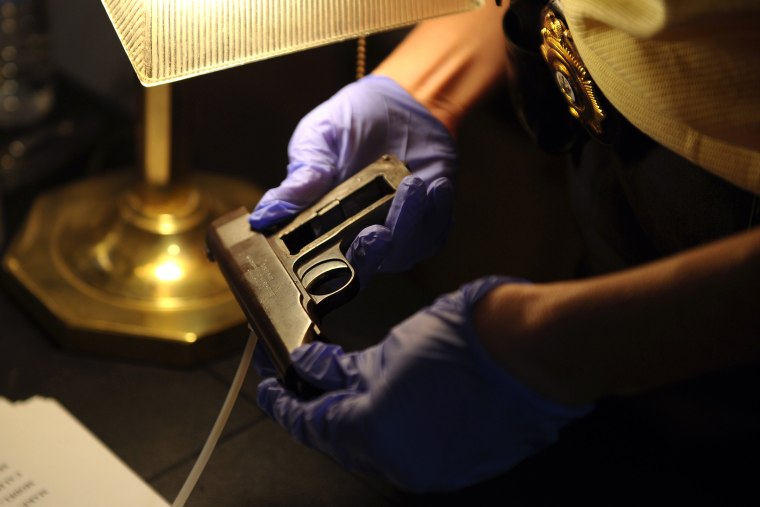Boston Mayor Martin Walsh hopes to initiate a gun buyback program in a proposal he made just days after a nine-year-old boy was shot and killed in a neighborhood outside the city.
A 14-year-old boy was charged with killing his younger brother on Feb. 7 in Mattapan, Mass., during an alleged accidental shooting. He was arraigned Monday on charges of involuntary manslaughter and unlawful possession of a firearm.
"The mayor and the Boston Police Department have been discussing a number of strategies to address the violence in our city, including the possibility of a gun buyback program. The mayor and [Police] Commissioner [William Evans] agree that the city needs to take a comprehensive approach to getting guns off of our streets, and we will continue to share information about specific plans and programs as they are worked out," Walsh's office said in a statement issued on Saturday.
Walsh declared his proposal last weekend in the city's first gun buyback program since 2006. Walsh was sworn into his new position at the beginning of January, replacing 20-year Mayor Thomas Menino.
Boston police officers have seized 56 illegal firearms since the beginning of the year, according to the Boston Police Department. Comparably, they removed 667 guns from city streets during 2013.
Concern arises following the establishment of these programs, however, because there is no assurance the guns are traced once seized by police, said Jim Wallace of the Gun Owners' Action League of Massachusetts.
"We kind of laugh at the concept of gun buyback when they didn't sell them in the first place," Wallace, executive director of GOAL, told msnbc. "If gun buybacks were supposedly effective, then why don't we have drug buybacks?"
"These are look-good, feel-good proposals, but really don't have any effectiveness on the street," he added.
Buyback programs sometimes only remove "crime guns," firearms not likely to be used for violence, said Jack McDevitt, a criminal justice expert and associate dean at Northeastern University in Boston. But rewards that include tickets to a popular concert or sporting event, instead of gift cards to Walmart, can motivate young people, he added.
"Anytime you get a gun off the street that could be used in a crime, that’s an important first step," McDevitt told msnbc. "But you can make it even more effective by focusing on incentives that young people find valuable."
Related: 'Too Young to Die' series
The Committee to Reduce Firearm Violence last week presented Massachusetts House Speaker Robert DeLeo with a 23-page report outlining 44 recommendations for reform. DeLeo last March asked the appointed task force to explore proposed reform policies following the tragedy in Newtown, Conn.
Among the group's analysis were suggestions for the state to enact a single-licensing standard, require every gun sale be processed through a licensed gun dealer, mandate gun-storage, and refrain from implementing further restrictions on large-magazine capacity. Gun owners, non-gun owners, and experts in law, mental health, school administration, and law enforcement comprised the task force, led by McDevitt.
"Massachusetts had good gun-control laws, they were strong, but there were places where they were inconsistent or illogical or needed to be redefined a little bit," McDevitt said.
GOAL this week released its own response to the task force's report, declaring that it neglected to recognize the failure of Massachusetts gun laws in reducing violence. The inability to analyze the symptoms of the legislation thus makes suggestions inadequate, the group said in a statement.
Massachusetts was among the 11 states that didn't enact any firearm laws in 2013, despite reform action in nearly half of the country. With a "B+" grade, the New England state ranked sixth out of all 50 in the 2013 scorecard released in December by the Law Center to Prevent Gun Violence and Brady Campaign to Prevent Gun Violence. Among other allowances and restrictions, the law in Massachusetts bans most assault weapons and high-capacity ammunition magazines, but it does not require the reporting of mentally-ill individuals to the federal database.
Massachusetts had the second lowest number of gun deaths per capita in 2010, according to the report.
